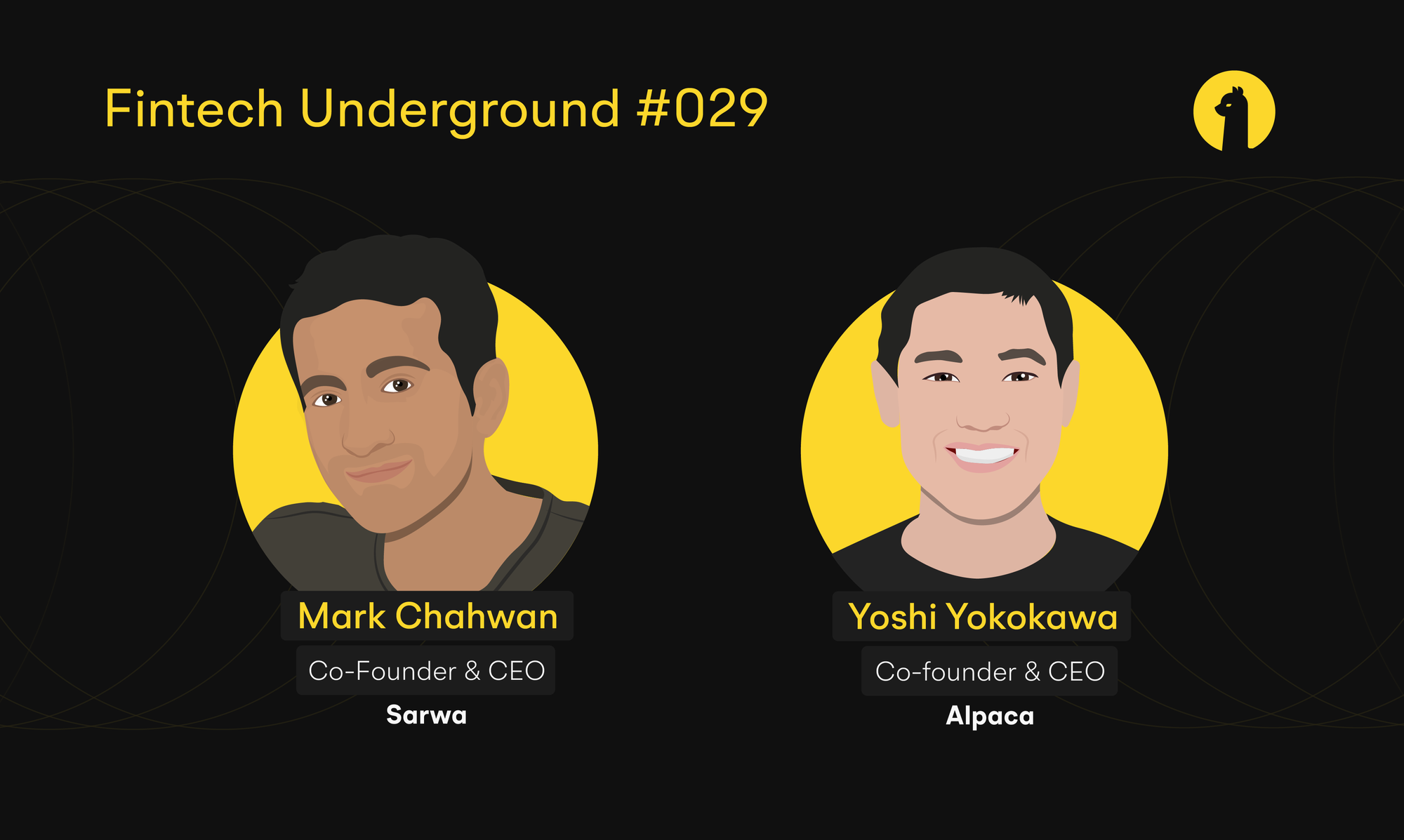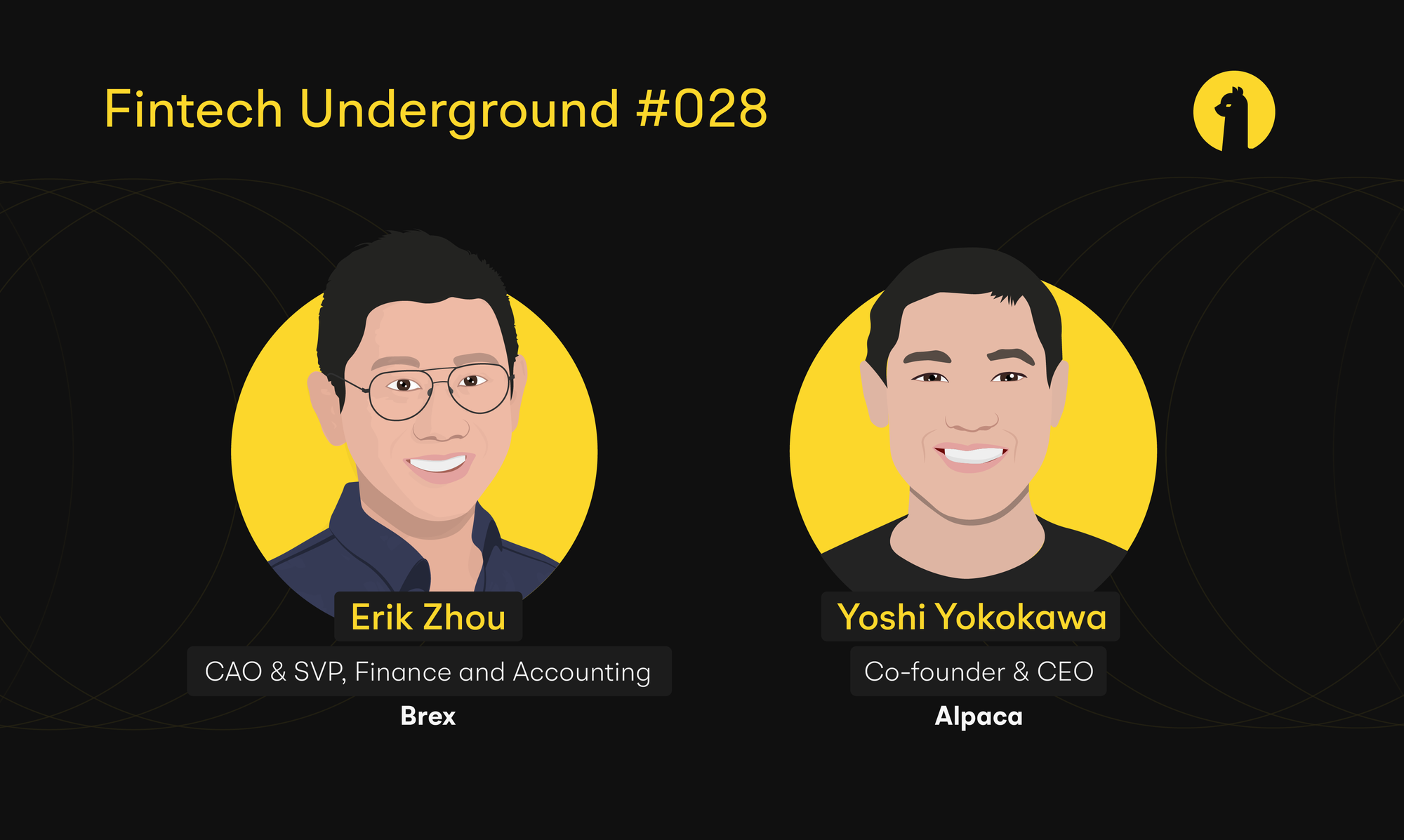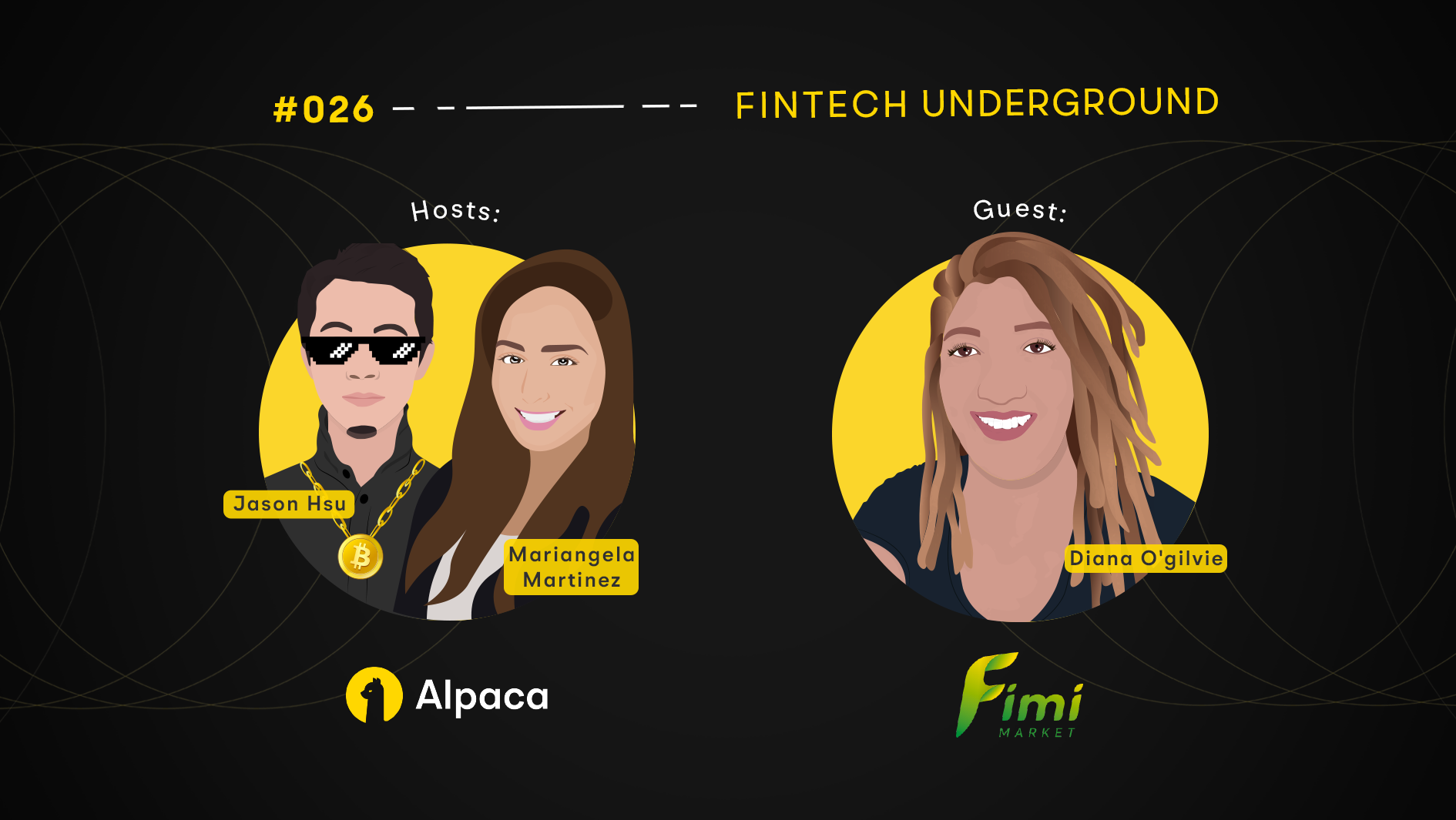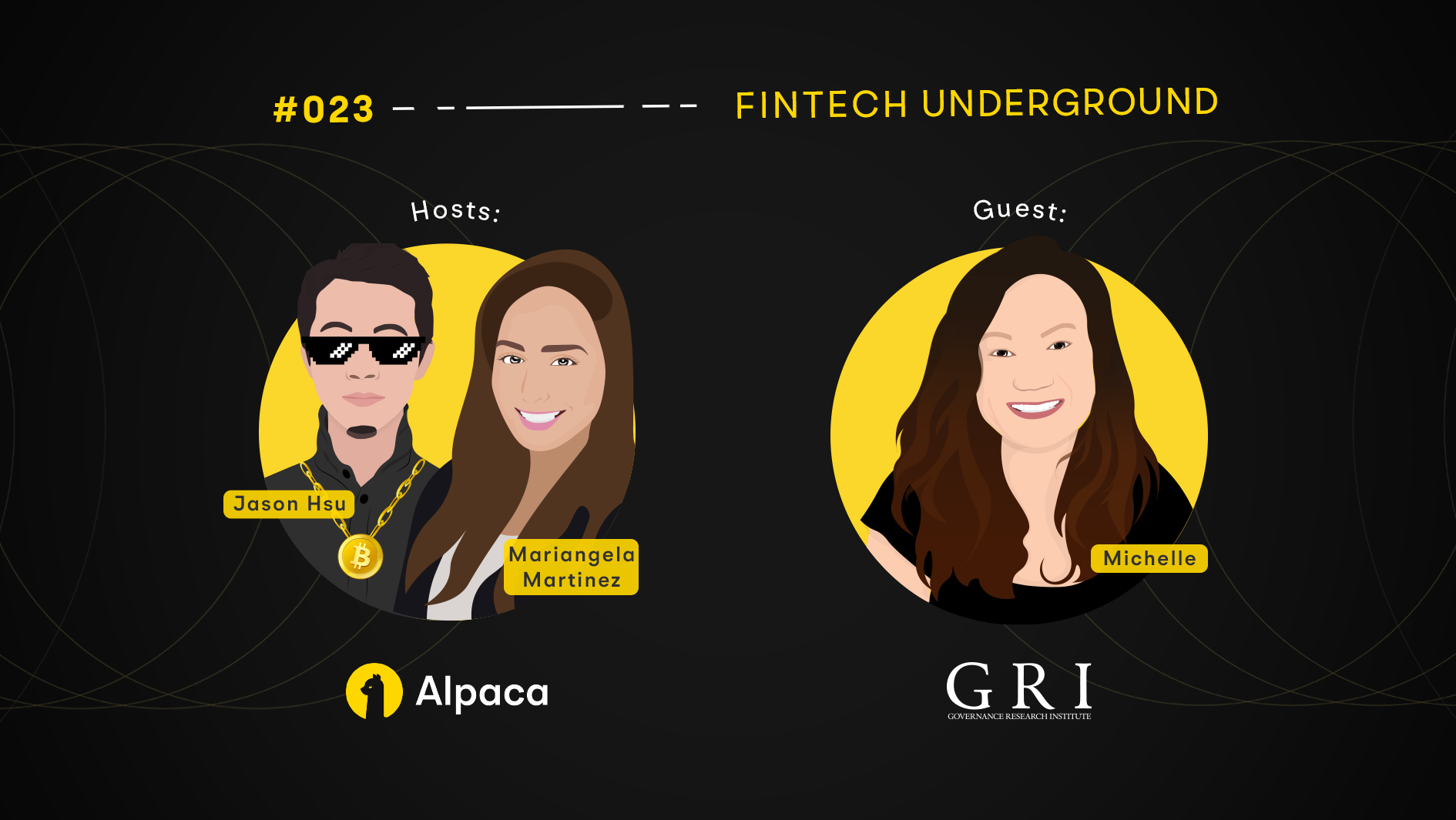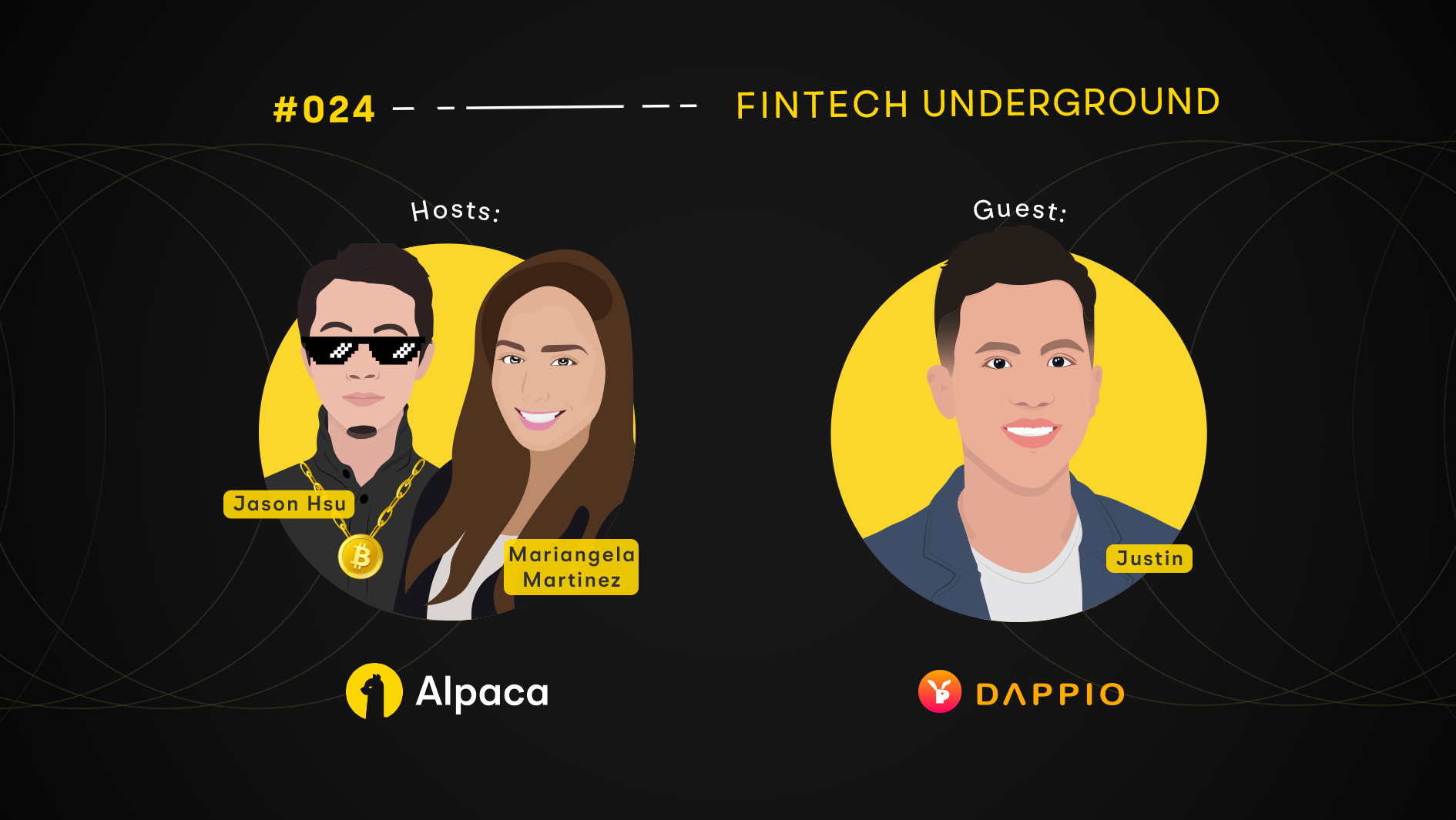
All views and opinions expressed by the guest speakers are solely their views and opinions and do not reflect or represent the views and opinions of Alpaca Securities LLC, Alpaca Crypto LLC, and AlpacaDB. The guest speakers' opinions are based on information they consider reliable and therefore Alpaca Securities LLC, Alpaca Crypto LLC, and AlpacaDB do not warrant its completeness, accuracy and it should not be relied upon as such.
The content is for general informational purposes only. Alpaca Securities LLC and Alpaca Crypto LLC do not recommend any specific investments, investment strategies or cryptocurrencies.
Fintech Underground by Alpaca is a podcast devoted to all topics related to stock trading and APIs. From trading with algorithms or connecting apps or building out services, we aim to bring light to the different corners of Fintech.

TL;DR
In episode 24 of Fintech Underground by Alpaca, we interviewed Justin, co-founder of Dappio. We talk about his journey to where he started building in DeFi, what it takes, and the difficulties, and what has changed from a year ago to this crypto winter.

Find the full transcript below. To hear more of the most interesting Fintech companies speak about their experience in the industry, check out our other episodes below.
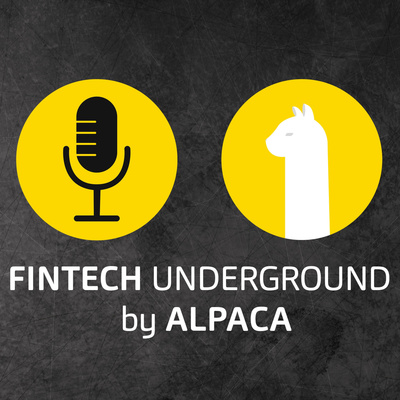
Full Transcript
All views and opinions expressed by the guest speakers are solely their views and opinions and do not reflect, represent the views and opinions of Alpaca Crypto LLC. The guest speaker's opinions are based on information they consider reliable and therefore Alpaca Crypto LLC do not warrant its completeness, accuracy and it should not be relied upon as such. Alpaca does not recommend any specific cryptocurrencies.
Alpaca is a developer-first startup focused on building open APIs for stock and crypto trading, investing, and embedding. You can learn more by visiting our website at alpaca.markets. You can also find us on Twitter @AlpacaWeb3 or join our discord community also with the invite link @AlpacaWeb3.
Mariangela: Hello, I'm Mariangela Martinez, host of FinTech Underground. And this is Jason Hsu, Crypto Growth Manager at Alpaca.
Jason: Hello. Today, we'll be talking to an old friend.
Mariangela: We will be hosting today's podcast about getting into DeFi and NFT world. Our guest today is Justin Wang. Founder of Dappio. Dappio is a one stop solution platform that aggregates yield across DeFi and NFT. With Dappio, you can aggregate farming, lending, staking, and strategy yields, as well as build on top of Dappio.
I just wanna go ahead and say that any topic talked about in this podcast is not financial, investment, and/or tax advice. We encourage our listeners to seek individual advice should they deem it necessary.
Justin, can you tell us a little bit of intro about yourself?
Justin: Yeah, for sure. Thanks again for inviting me to this podcast. So yes, my name's Justin, I got into the space in 2014, and then ever since time, my first job was working for XRP as a Marketing Lead Hong Kong for about a year, almost a year and a half.
And then later, I moved back to Taiwan, worked there for name foundations for years as well. And then, eventually I got myself to a place in Singapore for VC, and then be advisoring projects to build from zero to one. And I also go to strategy from one to two.
And then in 2020 got into Solana as an advocate. And then, you know, I've always wanted to build my own projects, but, timing really matters. So, I hadn't really found the right partners at that times. So I kind of took a step back.
In 2021, met couple developers in our regions, my cities, and then we started really discussing like why is it like to build a project that can disrupt the entire ecosystem? And yeah, here I am, Dappio is well funded. We are around 12 people on the team right now, over the places in Tokyo, California, Taipei and different parts of work, obviously. So, very excited to assure more influence about Dappio. Also my personal takes on Solana ecosystems.
Mariangela: Thank you. And what made you start Dappio?
Justin: So, I think there are a lot of motives to start a project or to even fund projects. I mean, obviously there are people that wanna make money or that wanna make money out of the funding. They will choose to start projects, but for me that's a bit different.
I started Dappio cuz I saw the needs for the ecosystems. I was using the dapps on Solana on a daily basis. And I realized that there needs to be change, you know, there needs to be a platform that kind of like helps me to track all my performance and also to help me to manage or even inform me the the highest APY out there for the markets right now.
Like I said, I think feature, there should be a spot for aggregators without the questions. For Dappio, I don't just wanna build aggregators. in fact, I think Dappio is optimizer. What does it mean by optimizers, means that we are here to optimize all these UI/UX experience with all the products available on Solana. And then we're not just integrating projects with UI. We're also integrating projects with their backend as well. Which means we can do a lot of customizations with the product that we have integrated with.
I'll give you guys our classic examples in real life. Let's look at Agoda or Trivago or Booking.com, all these travel aggregators for flight tickets, hotel accommodations, or even tour guides. Like these other websites that have aggregates over thousand or 10,000 of sites from all different places into one website. So this is something that envisions as well. You know, the future of DeFi or NFT service, it should be aggregated or optimized in a place where people can use on a daily basis, rather than figuring out what's going on. Is this protocol safe? Or is the APY sustainable? So there should be filters, I would say. So, back to the questions, this is what drove me to build Dappio since day one, where I think using Solana on dapps should just be as easy as using apps on mobile. So, yeah, by far we have integrated 12 protocols, I think by, I don't think anyone has ever done this far of integrations on Solana yet.
And, we're not satisfied right now, you know, I think in fact, we are actually on a way to almost 14 integrations by far, and then Public Beta is just right at the corners. We're also very excited to talk about that as well.
Mariangela: How did you first get into DeFi?
Justin: Yeah, so I got into DeFi back in 2019. I remember, late 2019-mid 2019. I think it was mid 2019. So, my first experience was providing liquidities for Ethereum and USDT on Uniswap. I think you guys probably know, it ain't about providing liquidities it's about users rates. Are there people swapping or not that will affect the APY itself. So, Uniswap that time had less than 50 million TVL. I think I deposited a couple hundred dollars there, the APY was better than a lot of platforms, but people just don't know what they're getting themselves into, right.
So I deposited USDT and Ethereum pair, I think. And I was earning a daily fee with Uniswap and I got fascinated. I was like, we don't have this for any DeFi. Yes. I mean, for any products, yes. Like you can earn a passive income in a decentralized manner. And then that's the time where I started looking into Kyber networks. There was a balancer. So there was a balancer Kyber network synthetics. And, yeah. And then also lens was called ether lens. It wasn't called Aave actually it was called ether lens. And later I think ether lens rebranded into aave, but you know, these are the projects that really, really, struck me in the first place where, how we could work and scale a decentralized product to financial products for everyone else in the world.
Mariangela: What was your experience with raising money for Dappio?
[00:08:22] Justin: I mean, honestly the raising parts of the journeys, it wasn't, it's not as easy as everyone thinks to be honest. We raised 7+ million dollars. It took us about three months. I probably did endless calls on this. I probably did at least 50-80 calls, just to intro-follow ups. But frankly speaking, it wasn't as tough as I thought, obviously like a lot of people know my name in some degree. So that actually made my life a lot easier in some ways. You always do business with your names, with your reputations and then it kind of kicked off from the first round where I got some big names invest, sorry, I cannot reveal right now. We haven't announced yet. But it kind of like escalated from there. And also timing is very imporant. When we raise money, like Solana always has this narrative, like the evm. And then I think price was relatively high at that time when we raised. So, yeah, I think overall I do say that I had a pleased experience. So with the fundraising part.
Jason: This seven mill is just one round?
Justin: We split into four rounds.
Jason: Four rounds. Okay. Okay. And they're all token raised?
Justin: They all token raised.
Jason: Okay, cool, cool. Did you guys get into the Solana launchpad first or did you raise first?
Justin: Launchpad as like official hackathons or?
Jason: I don't know. Did you guys receive a grant from Solana?
Justin: No. No.
Jason: Not at all. Okay. Okay. So I guess you fundraised first and then you entered the hackathon and then..
Justin: Yeah, like the way crypto projects due nowadays, is you get angels, you get a strong name to back your projects, and then you slowly grow up on there. It is a network effect. Like people usually look at who's backing you. Like who are your angels, and yeah. If your angels are solid, it starts lining up. Usually does pretty well. Later on stage for ours.
Jason: Did STEPN start off this way though? Didn't they just enter the hackathon and then it just kind of gain a lot of attention and then..
Justin: Yeah, it's kind of funny. I can tell you guys the true story on this. So, STEPN and us, we actually joined the same hackathons for Solana hackathons. I think they won the fourth place, but we didn't get into the final round anyways. So, their narrative wasn't being recognized, I would say this way.
So I think there is a lady for multi coins. Not gonna say the names. You guys search it up. She kind of like became an angel for STEPN. I like her, she's very passionate and highly motivated person. So she introduced Sequoias India.
[00:11:49] That's when how these thesis changes, how our investor came in and everyone start fomoing. So how Sequoia, India came in and then I think they did some kind of promise with the iOS listings, which is very important for the apps actually. It just took off of theirs. You know, people were trying to invest in STEPN, Binance labs, Huobi ventures, all these, Solana Ventures as well. I think there were only a couple, 1 or 2 VC that really believe in STEPN in the early days. But yeah, they did pretty well. I'm not gonna argue the fact that people say their design has flaws, but to get the products in a scale like this, it's not that hard, you know, speaking from a founder.
Jason: Yeah, yeah. Who won number one in your cohort if STEPN was number four?
Justin: Yeah. So I think it was Solend. It was Solend, was the first place.
Jason: Wow, I thought Solend was older than that, but okay.
Justin: Wait, Solend was older. No, I think we came from the same batch.
Jason: Okay, okay. Yeah, yeah. Maybe I just mistimed it. Got it.
Justin: Wait, actually, I think you might be right, cuz it wasn't so long actually. There's quite a few, you know what, that's the great thing about Solana now, we do hackathon once every three or four months, so I think, I probably have to do a search up better on this, but don't call me, I think it's couple, it's DeFi projects for first place.
Mariangela: Have you seen changes in raising money from a year ago to today if you've been looking for anything?
Justin: Yeah, for sure. I'm also very active in the primary markets, obviously. I definitely see that investors are not investing as active as before. I think a lot of investors are still waiting for, to come down for evaluations to come down, but I still see smart money being investing aggressively to the things that they believe the narratives is there. I mean, we have to look at some realities with some data numbers that back in 2018's, we only have like 1% of the world know about crypto or even using crypto right now, we are reaching at least about 5 to 6% or almost 10% in the future.
So it's a change, we have this numbers, this amount of people are passion or devoted into the industry. It's hard to see evaluation come down, frankly speaking. In addition to that, crypto projects have a shorter, I don't wanna say this in a bad way, but people are here for short term place, which is beneficiary for investors, also founders as well. That a lot of funding projects are easy to pivot into a new projects for VCs, they have short on luck, usually they profit earlier. So it's the cycles that is happening for this industry, which has been longest time ever, actually. So if you were gonna ask me that maybe in a couple months later, is it gonna change or I don't think so. It's embedded to the culture or crypto, you know, people are looking for fast money quick money to grabs. So, I still think that 80% of VC will die and I think the 20% will still survive through the next cycles.
Mariangela: Wow. Okay. So now going into Dappio, can you tell us about the difference between DeFi Wonderland versus NFT Wonderland?
Justin: For sure. I think I got this questions a lot from investors or our community members, is that I think the future of NFT and DeFi they will interact with each other interchangeably, meaning that, you know, as we are seeing more NFT borrow-lending, infrastructure coming up, and then we're seeing more NFT finance, such as fractionized NFT, where you can fractionize your NFT into tokens and you can start depositing those tokens into liquidity pools, liquidity votes, and earn extra yield on top of it. I think this is something that without DeFi, I don't think there will be NFT finance.
So I think the visions that we we're trying to have for the IPO is that, we actually been in contact with a couple NFT finance project on Solana where we wanna be integrated with. So let's say that you have NFT A, NFT Bs, you can fractionize NFT A into tokens providing liquidities. Then you have your positions and then you might use the profits from a fractionized NFT and then redirect into the DeFi pools.
So you're basically earning yield, you're compounding the yields from all these different categories, fields. And then, so why not putting all these into one platforms, right? It's easier to manage your portfolios. It's easier to track what's going on with your performance. So, terms that Wonderland is to making sure people can feel safe, secure, coming to Dappio, but at the same time leveraging all these top protocols or emerging protocols with us.
So obviously you guys can see on the roadmap, for the phase one focus we wanna aggregate pretty much all the protocols, DeFi protocols on Solana, and then pivot into NFT finance on the phase two. We are also building a lot bigger things than people think, right, which we can talk about later. We are also building this universal rabbit hole. It's a framework.
Jason: Everyone's looking to segmenting or providing more liquidity, making NFTs more liquid in a way, right, with these. And there's all these NFT rental protocols too, like Vera double. So whereas like on STEPN, the NFT shoes are not rentable yet, but these protocols on the side are helping them achieve that. Like it's already live, like it's doable. So, yeah, pretty interesting stuff.
Justin: I mean, I think the concepts of renting right now is commonly being used. It's like, I go on bike, any cities that can rent, rent this and rent that, return this and return that, I think it's something where internal money, for example, you want play the games, if you need the characters NFT, you don't have to buy the characters, you can just rent the characters and then play the games and you can have the items and then you can, whatever items you profits is on chain obviously you can share the profit with a player A, player B, which just something that I vision too. So..
Jason: It's also really intricate now, right? Like it goes into a smart contract rather than like withdraw into your wallet. So that might prevent, it's not straight up borrowing in a sense. So like, if you were to rent apes, you might not get ape coins like drops, for example. Yeah. I mean, I think the implementation and there are limitations to it, they might be good, cuz like farming, apes and getting the ape coins dropped to them like that was not the intended.
Justin: But, I mean, people don't really get that, I think that what got this market is very fast paced, is that you get huge amount of people that are big brains, you know, and the big brains love creating narratives, ideas. Career ideas or career ideas, you know, have innovative thoughts, share that I think, well, this is walk out in this industry to this place is that literally people don't really care about your degrees. You know, you can have a say on Twitter. If your narrative, if you stand your point of views, rights, people listen, people follow you. I mean, people actually save Twitter, you know, , I couldn't imagine when was the last time people talk about, "Hey, tweet this and tweet that," a couple years back.
But I recently actually met a guy from Pakistan. I just, not even graduated from college yet. First year college, also developer, self-taught developer on Solana. He re-sparked my attention. The fact that he didn't graduate from college, he didn't even go to computer science majors, but he was able to learn Solana, through Twitter, through tutorial websites, which is free, obviously. And then being able to connect with people. Yeah, he actually inbox me, messaging me, that we would like to be an intern for Dappio.
So we were just, we're still chatting, but this is how powerful an industry can get, like literally everyone around the world can have a say, can have contributions in a fair place. So..
Mariangela: Yeah, that's great that he learned that way. That's incredible.
Justin: Yeah.
Mariangela: Can you tell us more about DeFi V2 Public Beta?
Justin: Yeah. So the V2 beta, we are scheduled to go live, not supposed to say this, last week of August, first week of September with the Public Beta of V2.
Mariangela: Oh, soon.
Justin: Yeah. A couple weeks. So we're working very hard toward this. Well, I think when Public Beta goes live, we'll have at least 11 protocols on top of platform and then later in the stage we also are gonna start opening our votes, vote that interact with the protocols that we have integrated with.
I think people don't really get that we are not only integrating people like projects on the front end. It's not like we build another site just to compensate or aggregate all these protocols in one place. We actually put their code, their programs, we don't code smart contract in Solana, we interpret with their programs, we interpret with their SDK into our platforms. So we can do a lot of customization. A lot more than just being a front integrators so we can do a radar, so for example, if you deposit your stables into our vaults, we can track the highest lending APY for you. And then we can always maintain the highest performance for the deposits as well. So this is just one of the examples that we could do on top of wild platforms.
We could also auto-compound. All the pools are available on Solana that has been integrated with us. So right now we've integrated with Orca, Raydium, Definity, Sabers, like all the pools that are available on the performance will be other components. So again, you know, we're not here to competing with anyone, we are to propel the propel and then promote entire ecosystem. Yeah.
Jason: How often does it compound, is it a daily thing?
Justin: It's a daily thing.
Jason: Yeah, okay, okay. And then do I have like the option to lock up for two weeks to get higher yields?
Justin: No, you can unlock any time. So I'm not a believer of locking people up for these pools, but you know, people have options, right? So again, like all these traffics, they would redirect into protocols, not us. So like we weren't making a lot of noise for the past couple months, but I think especially this month that people realize that we don't have projects like Dappio, you know, like projects that are actually helping them to gain more attractions, attentions.
So, yeah, very busy on the BD side, just to make sure that these protocols are integrating with us have the standard, have the qualities to provide to our users as well.
Mariangela: Now, why Solana?
Justin: Yeah, it is a great question. I get these questions a lot, even at the Solana hacker house. So, you know, I have advice quite a few projects on EVMs so I know what it looks like and the way it tastes and what usually faces as a founder to build EVM project. I think there are a lot of arguments that I can make toward EVM narratives and then the communities EVM.
Don't get me wrong, I love Ethereum's. I love the innovations there is. But you know, you need a competitor sometimes, right? Like imagine the world only has McDonald without Burger King. I often use this narrative, people are like kind of makes sense. Like we have options. We have to know who is better, right. So, Solana started as, we didn't start as a EVM killer actually. We started as a notions, as a belief that blockchain should be easy and cheap and fast to use. So, this was the narrative back in 2020 for Solana. It wasn't called as EVM killer.
And later in 2021, Solana was really was hitting all these traction exposures. And then you see all these killers that are saying that, "oh, we won't be using EVian a couple years later. We'd be all using Solana." So Solana actually grew this far. It wasn't promoted this far. Like people don't really get like, if you go on Twitter and I'm pretty sure Jason knows how crazy Solana community is on Twitter or Discord it's not, we can always find a better blockchains than Solana, Ethereum layer 2, there are indeed a lot of better blockchains than all these protocols, but people don't really get that, why it takes to be a better blockchain as the communities. It's the believers, developers and the people behind these protocols. So Solana is unique where I think people can argue like its a bit centralized towards EVM chain, but we are improving, you know, I think 2020 we only had like less than 20 validators, we now have over almost 2000 validators. We're 10x in two years. And then with the price was lower right now, I can only imagine we're gonna increase the amount of validators in the future. And first is that.
And second, I think a lot of people choose Solana. First is communities. There's a user base obviously, people are actually using Solana with NFT, DeFi. Secondly, it's cheap, affordable. I think, this is probably the reason why I think if you wanna bring dapps to our mass adoptions, you cannot charge somebody for $50 per transactions. I mean, you might not feel anything. If you are holding a decent amount of monies, or metamask, but you know, we are looking at a future generation of people using your dapps, people that are in high school, people that are still in college are still own school loans having student debts. These are the people that are not gonna choose $50 gas that are gonna choose the place that's cheap and fast. And third is the culture. I think culture plays huge roles for decentralized communities. I think someone has unique communities, services, unique cultures that everyone's on the same path. You don't see anyone attacking anyone's arguments and narratives versus are not gonna enable chains on the EVM side of it.
You see all these people fighting against each other. And then everyone will come out saying that, you know what guys stop mergers happening. You guys are all gonna walk away with other alternatives. I don't think this is the part where a healthy change should have. I think here's the reason why I'm actually bullish with the narrative on Ethereum.
So, we only need one layer to translate everything, to be honest. And then in fact, I just got back from Europe. I was there for hacker houses. Like this is the feedback I got from a lot of European developers were saying that they don't wanna build projects that they have to build on multiple layers. Blockchain should be one there, it's like a AWS GCP where they should focus on the innovation of products. Brought it, and then there is one more layers, like everyone's moving toward there. We have to migrate over to this layer. We have to figure out how can we move over. You know, it's time consuming.
I don't think in terms of opportunity cost perspective wise, it's not sufficient for a team to build products like this.
Why do we have layer two in the first place. It's to become alternators, this is the most important part. When you are building a product to become alternators, you are just a options. You are not the only option. This is very important. So if there is a pizza coming to the table, you slice that into four slides versus 12 slides. It matters. Everyone gets different portions. And is it concentrated in terms of, if we talk about the liquidity for the slice of pizza, it's not everyone gets their own portion, the more slice you cut, less portion everyone gets, and it's something goes the liquidities for adapts or for user base, actually. It's hard to craft at the user base any other chains. I even hear layer three right now. It's fascinating that people are trying to create the layer.
Jason: I mean, I know there's a whole movement to like layer zero.
Justin: I mean, layer zero has always been there, like Cosmos, the IBC, like it has always been there, there is zero, but we talk about layer 3s, on top of all the layer two, there people building right now. And I think a couple weeks ago we had the documentation release is called zkEVM, not sure if you've read that before, I encourage you when to take a look on that. I think the zkEVM they're gonna wipe out a lot of layer too.
Jason: That would just be layer two itself though, right? A lot of layer twos have like zk Snarks, zk rollups.
Justin: Well, I think zkEVM, it was a lot more compatible for the needs, for the layer ones. And then, I mean, the moment you switch RPC, you are going to a different chain. Like you're not, if you're in layer one anymore, like people know it, like people actually know the tech, like the moment you switch RPC, you are changing the liabilities.
So, I mean, all these layer 2s, they can brag about on the solution for Ethereum, but in fact, they're on their own, right. Fantom, Avax, you know, metis. There are least how many layers are there, a dozen of it?
Jason: Yeah, probably more than that.
Justin: I don't want to sound like I'm arrogant on this, but I think at least dozen of layer 2s. Like even, I cannot keep it on tracks over all these layer two sometimes.
Mariangela: Okay. And so going to recent events, has this crypto fall affected Dappio in any way? And if so, how?
Justin: Not really, actually it's, I mean, the reason why I started Dappio it's not to play with the volatility of the market to be honest. The reason why I start building Dappio is cuz I see the visions where we can be a daily use platforms. So I think that's very important, right? So, if you look at the on-trend metrics for Solana, we still get at least 50 to 1,000 thousand people using on a daily basis. So there are people still using Solana. Even when Solana was at $25. You can still, there are a lot of on chain activities. Twitter is still relatively strong. I mean, obviously it wasn't as strong as before, but this is the part where still got me motivated in a way that people still talk about the future of Solana.
You know, there is a vision. There is room for imaginations. That means there is a room for improvement. I think this is where Dappio came in. We are solving multiple issues for the career ecosystem. Very exciting. Our team members are still highly motivated. I know we are right at the corner for our public beta. I think it's gonna be exciting moving forward to see how these users react to our platforms.
Mariangela: That's exciting, congratulations. Since the fall of 3AC and Celsius, have you seen changes in the way your customers trade?
Justin: Hmm, I haven't really seen this perspective, but I do think that with the Celsius/BlockFi, all these centralized custodian management companies, it actually made me think that I'm even more bullish on the DeFi side of it, right. You hold your key and instead of giving your private key to somebody else, that's important.
Jason: Right. Right. Also, there's like two different groups of audience here, right? Like people who have put their money into Celsius, they kind of trusted their spokesperson and these semi-believable audits, or they're not really audits, maybe like reports, and just to have the money sit there and grow, whereas people who are actively trading on DEXes or DeFi protocols, they were probably, I mean, I'm in the middle. I mean, I do have, I never used Celsius, but I do use some CeFi services. But I would say the average DeFi user or like ones who believe in fully like self custody wallets, they would not be touching CeFi platforms. So yeah, like the disintegration of Celsius might have.. it gives crypto a bad name, but DeFi traders might not be affected as much.
Justin: Yeah, for sure. I mean, if you look at DeFi aspect of it's like you also have the chance to get rugged, you know, from a smart contract perspective, there is a risk of getting rugged. There's a risk of getting hacked. So, I mean, you just have to take the full liability knowing that which platform you deposit into and then who are the people behind these platforms, right. So, I think as the market continues going down, we might see more projects just given up on their audience, on their communities. And that's why I think there will be less projects surviving, but which means the one that survive few cycles would come out stronger.
Mariangela: Yeah. I agree. It's a great timing for deleting some projects and then having some new ones grow a lot. Would you like to say anything else to our listeners?
Justin: Yeah, I bet a lot of listeners are either investors or developers, I think this is the time to get to know more about projects. You know, when bullish sentiments, people tend to think that they know everything. Like in fact, I think 90% of the people don't really know what's going on with the protocol, with the communities. They don't have the standard to do a better due diligence when a bullish sentiment comes, but now the sentiment is relatively bearish. I think that they have more time to really think through what kind of projects they wanna believe in, what kind of narrative, nails of buy-ins as well. And then when the narrative kicks in, this time they would make it. I think this is usually what happens, right?
I think during the various sentiments, it's not easy to discover a narrative, but at the same time, this is where the diamonds comes in. You know, just have to find the dimes from all these projects. And I believe in it, stay with them. And then I think we only have a prolonged bear markets, like in 2017. It's just so much different right now. You know, we have a wall street institution coming to the space. We have national banks, even governments, El Salvador, you know, it's different skills right now compared 2017-18, right.
Back in the days, we only even hear a institutions coming to crypto. Like there weren't any institution to be honest, but right now we see family offices. JP Morgans, Goldman Sachs, Bloombergs, like these tier A Wall Street companies, firms, hedge funds. They all have exposure to crypto. It's an instrument. It's an instrument for the Wall Street financial products right now. Like, you go on CNBC, all these financial websites, there'll be a section for crypto. This is going for a mass adoption.
So I don't think it's a polo market. If everyone thinks that it's gonna be a pull and bear market, we're going down 400 ether find ether. I don't know about that. I don't know about that. I don't know about that cuz everyone just be shorty making money. It's a bit different right now. You know, a lot of people are taking leverage, when people are shorting they have a chance to get squeezed means market can go up. So I think it's just gonna be harder to predict the market right now, but you know, as a builder, we actually we have relief in a way that we don't have to chase the pace. We don't have to chase the momentum. We don't have to chase the price, infecting our developments. So it's a good time to build.
Jason: For sure.
Mariangela: Yeah. Justin, thank you so much for joining us in our podcast. It was a pleasure having you here with us and thank you for sharing your insight. Congrats on Dappio, it's going to be great and good luck on building.
Justin: Thank you. Thank you guys for inviting.
Mariangela: Thank you. You can find Justin on Twitter @dappiokeeper, Dappie on Twitter @DappieGangNFT, and @Dappio_, and Dappio’s website is dappio.xyz
Justin: So you guys in the Wonderland.
Mariangela: Yes. See you. Thank you.
The content and comments of this podcast should not be taken as Alpaca providing investment legal, and/or tax advice. Every situation is different and you are encouraged to seek independent, legal and investment and/or tax advice. Cryptocurrency is highly speculative in nature, involves a high degree of risks, such as volatile market price, swings, market manipulation, flash crashes and cybersecurity risks.
Cryptocurrency is not regulated or is slightly regulated in most countries. Cryptocurrency trading can lead to large, immediate and permanent loss of financial value. You should have appropriate knowledge and experience before engaging in cryptocurrency trading.

